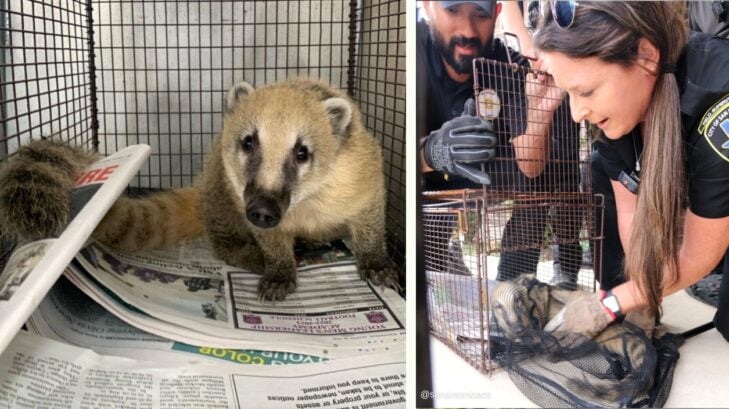The City of San Antonio Animal Care Services said that a man who goes by the name Mr. R walked out onto his porch on Friday morning (Jan 6) and found a non-native species of a diurnal animal clinging to a porch pillar.
Mr. R told animal care services over the phone that it looked like it needed help, so they came right away.
“After a quick call to 3-1-1, ACS officers knew the scared animal was likely a coati, a wild, non-native species prohibited in San Antonio,” City of San Antonio Animal Care Services wrote on Facebook.
Wildlife experts say that the coatis are normally found in Central and South America.
It’s very rare to find one in Texas and when they do, it’s often illegally owned by someone who is not supposed to have it according to state law.
Animal Care Lieutenant Snowden said that the carnivorous animal is often found in the illegal exotic animal trade and noted that the coatis are in the same family as raccoons and are definitely not pets.
Lieutenant Snowden along with Animal Care Sergeants Olivares, Lopez, and Delacruz drove out to the scene to help safely capture the non-native mammal.
“Once the officers arrived, they were escorted to a neighboring back yard where the coati retreated. This nimble creature gave the officers a good work-out in trying to capture her, but with teamwork- and a short sprint – they managed to safely contain her. It was then that they spoke with the self-proclaimed owner who lived on the same street,” City of San Antonio Animal Care Services wrote on Facebook.
The owner of the coati who was located in the same neighborhood could face a $2,000 fine for keeping the illegal pet but nothing has been publically confirmed if the person will be charged or not.
“Because coatis are wild animals, they are illegal to own in San Antonio and the state of Texas. After consultation with Game Wardens from Texas Parks & Wildlife, our team loaded up the young mammal and brought her to ACS before transferring her into the care of our amazing partners Wildlife Rescue & Rehabilitation, Inc.,” the service wrote.


